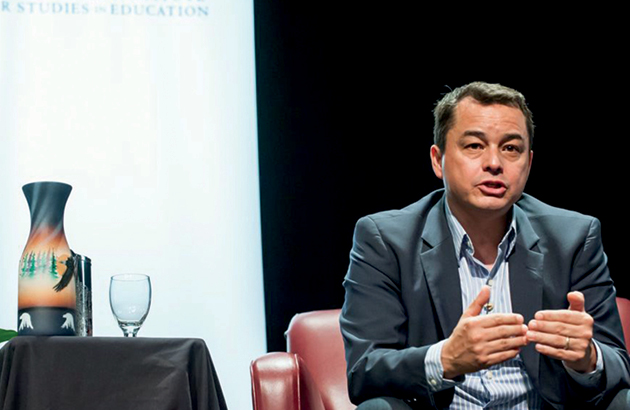Strengthening Indigenous Education

A new Indigenous Education Initiative at the Ontario Institute for Studies in Education (OISE) will generate knowledge that is relevant to education, and the study of education, in both Indigenous and non-Indigenous societies around the world. This five-year initiative is made possible thanks to a generous $5-million gift from an anonymous donor.
Posted on November 20, 2014
The gift, which is the largest donation ever made to a Canadian faculty of education for Indigenous research, will establish a prestigious fellowship and launch a comprehensive five-year initiative exploring the educational needs and aspirations of Indigenous peoples.
The initiative will help forge new partnerships among Indigenous peoples in Canada, government agencies, non-government organizations and the private sector with the aim of pursuing vital avenues of inquiry that will enrich all public education.
“The University of Toronto is already recognized as a world leader in Indigenous education thanks to the dedication of scholars at OISE who have made Indigenous education a priority,” said U of T President Meric Gertler. “This gift affirms that stature and provides the support required to ensure that U of T continues to lead the way. This is a wonderful accomplishment.”
“The OISE Indigenous Education Initiative fully recognizes and embraces the principles advanced by Indigenous peoples and educators”, noted OISE Dean Julia O’Sullivan. “The initiative will support important dialogue on the advancement and achievement of those very principles.” Within this framework, the OISE Indigenous Initiative will focus on literacy during the first year. This priority is in keeping with the United Nations Sustainable Development Goals, which recognize the importance of investment in education and literacy, as crucial to social progress and particularly to the successful participation of individuals in their communities.
“The initiative is important because it further positions OISE as a postsecondary leader in Aboriginal education. OISE’s unparalleled focus in adopting Indigenous paradigms in education and research, posit possibilities of unprecedented changes, such as in literacy and mental health, and will be underpinned by support from this initiative,” said Dr. Suzanne L. Stewart (YK Dene), Canada Research Chair in Aboriginal Homelessness & Life Transitions and Special Advisor to the Dean on Aboriginal Education at OISE.
Building on its work on literacy, the OISE Indigenous Education Initiative will also pursue research in related areas such as Indigenous languages and language revitalization, education governance, and literacy infrastructure.
While the focus will be the Canadian context, the OISE Indigenous Education Initiative will generate new knowledge that is relevant to education, and the study of education, in both Indigenous and non-Indigenous societies around the world. The research is also expected to have a significant impact on policy in Canada.
“One of the great divisions between those who succeed and those who struggle relates to literacy and education. This is especially true with Indigenous children”, said Kenn Richard, Executive Director, Native Child and Family Services Toronto. “I applaud this initiative as we need to know how to build a system where all succeed.”
Chief Shawn A-in-chut Atleo has been appointed the first Distinguished Fellow of the William A. Macdonald, Q.C. Fellowship in Indigenous Education, and will play a lead role in forging important partnerships between Canada’s Indigenous peoples and other organizations.
“This new Initiative is an important demonstration of the role universities can and must play as places of discussion, partnership and innovation in support of Indigenous education and Indigenous people,” said Atleo.
